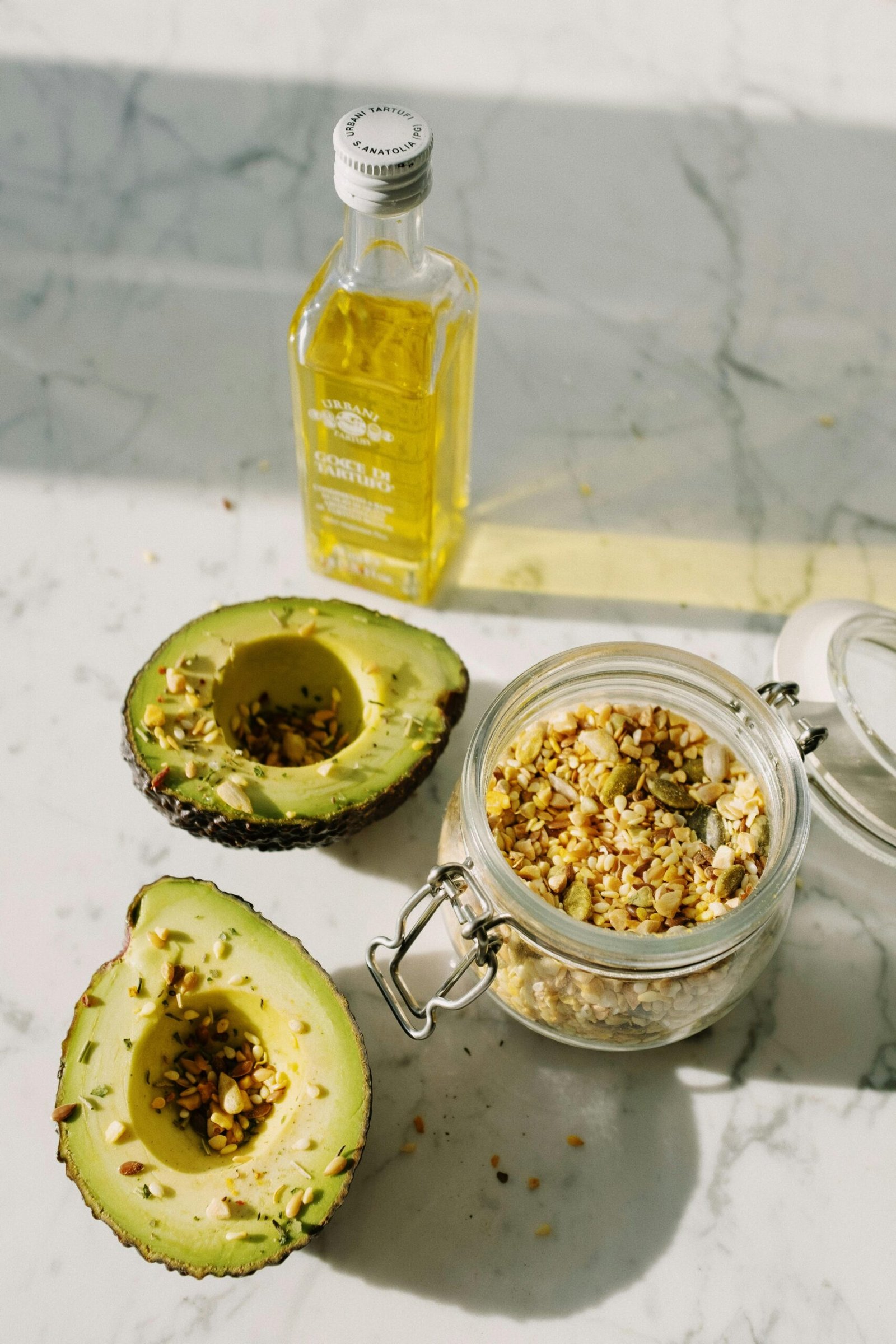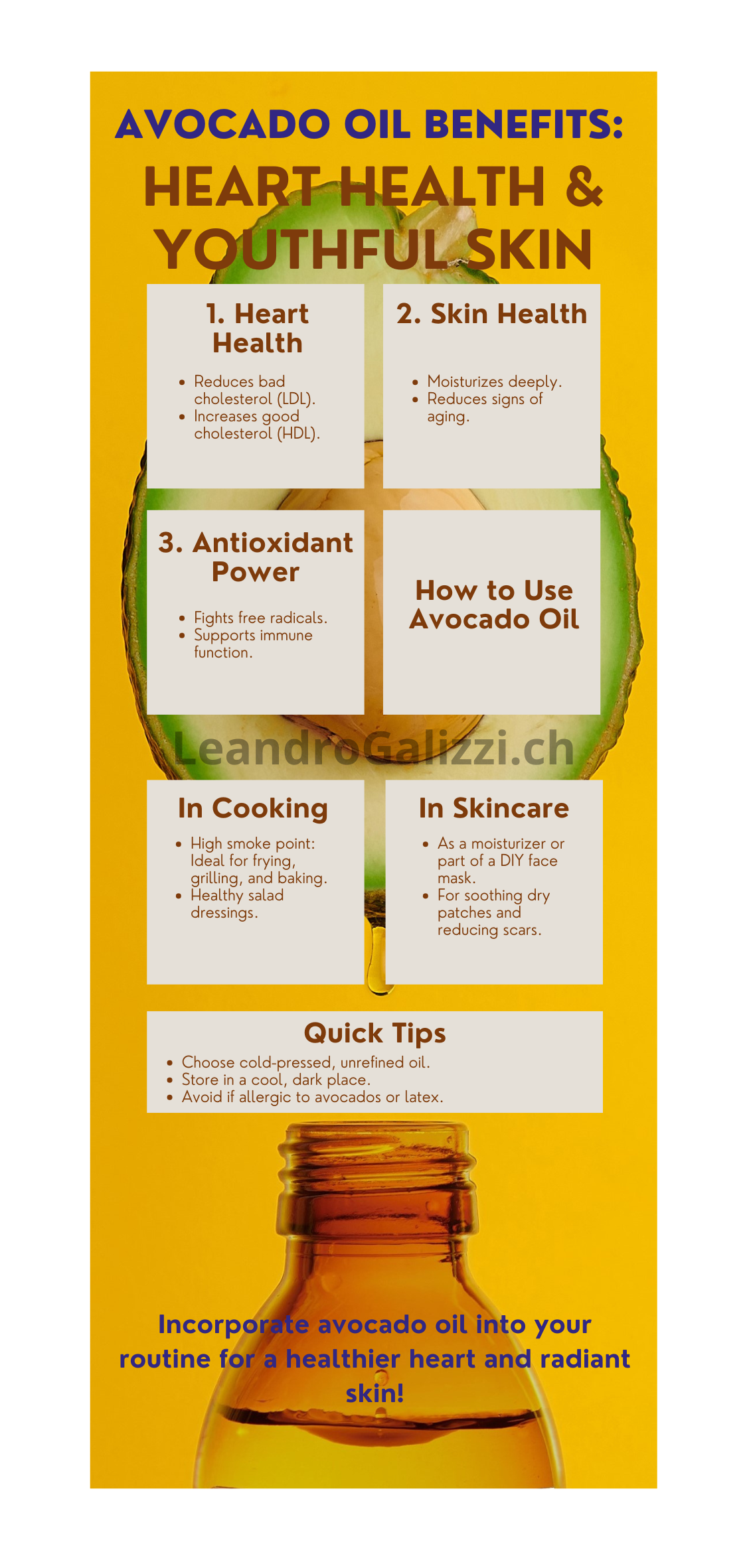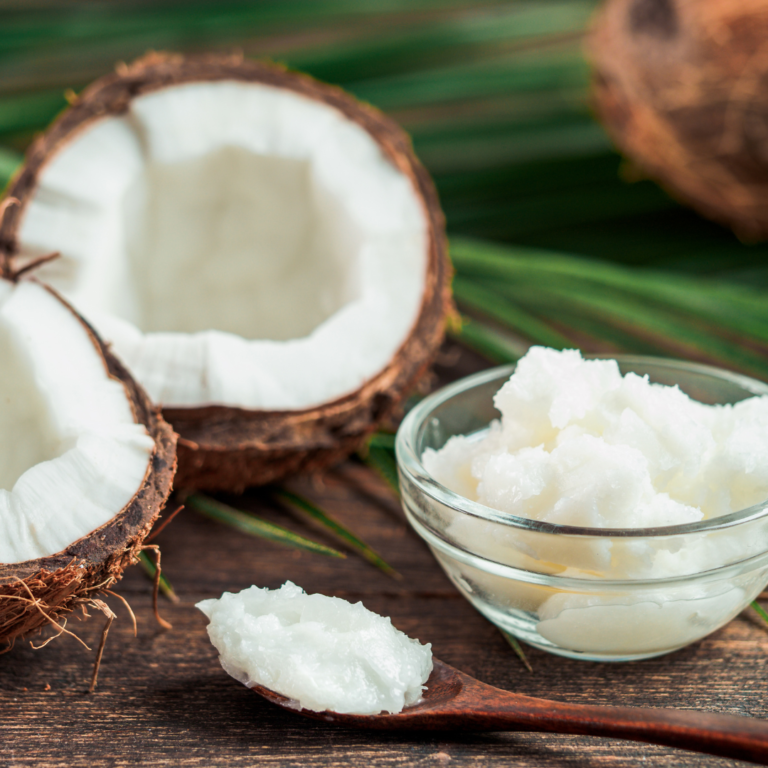Avocado Oil: The Secret to Heart Health and Youthful Skin

Table of Contents
- Introduction
- Understanding Avocado Oil
- The Eight Evidence-Based Benefits of Avocado Oil
- Avocado Oil for Youthful Skin
- Incorporating Avocado Oil into Your Diet
- Potential Risks and Considerations
- Conclusion
Introduction
Avocado oil is rapidly becoming a staple in the kitchens and skincare routines of health-conscious women worldwide, particularly those in Switzerland. Known for its rich content of healthy fats, vitamins, and antioxidants, avocado oil offers a myriad of benefits, from promoting heart health to enhancing skin vitality. This blog post will delve into why avocado oil deserves a place in your daily routine, highlighting its eight evidence-based benefits and providing practical tips on how to incorporate it into your diet and skincare regimen.
Understanding Avocado Oil
Avocado oil is extracted from the pulp of avocados, making it one of the few edible oils not derived from seeds. It’s renowned for its high content of oleic acid, a heart-healthy monounsaturated fat, and is packed with vitamins A, D, E, and K, along with antioxidants like lutein. These nutrients collectively contribute to the oil’s ability to support cardiovascular health, nourish the skin, and enhance nutrient absorption.
Unlike many other oils, avocado oil boasts a high smoke point, making it ideal for both cooking and raw applications. It’s often compared to olive oil, another popular healthy fat source, but avocado oil stands out due to its subtle flavor and versatility in both culinary and cosmetic uses.
The Eight Evidence-Based Benefits of Avocado Oil
1. Rich in Oleic Acid for Heart Health
One of the most significant components of avocado oil is oleic acid, a monounsaturated omega-9 fatty acid that is highly beneficial for heart health. Oleic acid has been shown to reduce levels of LDL (bad) cholesterol while increasing HDL (good) cholesterol, thus lowering the risk of heart disease. Additionally, it helps to reduce inflammation, a key factor in many chronic diseases, including cardiovascular conditions.
2. Reduces Cholesterol and Improves Heart Health
Avocado oil is particularly effective in managing cholesterol levels. Studies have demonstrated that the consumption of avocado oil can lower LDL cholesterol and triglycerides, both of which are associated with an increased risk of heart disease. At the same time, it helps raise HDL cholesterol, providing a balanced and heart-healthy lipid profile.
3. High in Lutein for Eye Health
Lutein, a carotenoid found in avocado oil, is crucial for eye health. This antioxidant is naturally present in the eyes and helps protect them from damage caused by light exposure. A diet rich in lutein can reduce the risk of age-related macular degeneration and cataracts, making avocado oil a beneficial addition for maintaining vision health as you age.
4. Enhances Nutrient Absorption
Some nutrients, particularly fat-soluble vitamins like A, D, E, and K, require dietary fat for optimal absorption. Avocado oil, when included in meals, significantly enhances the absorption of these vitamins and other beneficial compounds like carotenoids. For example, adding avocado oil to a salad can increase the absorption of antioxidants by up to 17-fold, maximizing the health benefits of your meals.
5. May Reduce Symptoms of Arthritis
Arthritis, particularly osteoarthritis, is a common condition that causes joint pain and inflammation. Avocado oil contains anti-inflammatory properties that can help alleviate these symptoms. The combination of avocado and soybean oil, known as avocado/soybean unsaponifiables (ASU), has been shown in studies to reduce pain and stiffness in people with hip and knee osteoarthritis.
6. Improves Skin Health and Promotes Wound Healing
Avocado oil is a rich source of vitamins A and E, both of which are essential for skin health. These vitamins help maintain the skin’s integrity, promote healing, and reduce the appearance of scars. The antioxidant properties of avocado oil also protect the skin from oxidative damage caused by environmental factors like UV radiation and pollution. This makes avocado oil a valuable addition to any skincare routine, especially for those looking to maintain youthful and radiant skin.
7. Has Antioxidant Properties
The antioxidants in avocado oil, including vitamins A and E, play a crucial role in fighting oxidative stress. Oxidative stress is caused by an imbalance between free radicals and antioxidants in the body and is linked to various chronic conditions such as heart disease, type 2 diabetes, and cancer. By neutralizing free radicals, avocado oil helps protect the body from the harmful effects of oxidative stress.
8. Safe for High-Heat Cooking
One of the standout features of avocado oil is its high smoke point, which is around 480°F (250°C). This makes it one of the safest oils to use for high-heat cooking methods such as frying, grilling, and roasting. Unlike other oils that break down and release harmful compounds at high temperatures, avocado oil remains stable, ensuring that your food retains its nutritional value without the risk of free radical formation.
Avocado Oil for Youthful Skin
Avocado oil is not just a powerhouse for internal health; it’s also a game-changer for your skin. The oil’s rich content of vitamins, antioxidants, and healthy fats makes it an excellent moisturizer and a potent tool against skin aging. Here’s how avocado oil can help you achieve and maintain youthful, glowing skin.
Moisturizes and Nourishes the Skin
The fatty acids in avocado oil, particularly oleic acid, deeply penetrate the skin, providing long-lasting moisture. This makes it especially beneficial for those with dry or sensitive skin. Regular use of avocado oil can improve skin texture, making it softer and smoother.
Reduces Signs of Aging
Avocado oil is rich in antioxidants like vitamins A and E, which combat free radicals that accelerate the aging process. These antioxidants help to reduce the appearance of fine lines and wrinkles, giving your skin a more youthful appearance. Additionally, the oil’s ability to boost collagen production helps maintain skin elasticity.
Soothes and Heals the Skin
Thanks to its anti-inflammatory properties, avocado oil can soothe irritated skin and reduce redness. It’s also effective in healing wounds and reducing scarring. The vitamin E in avocado oil supports skin repair, making it an excellent choice for treating minor cuts, sunburns, and other skin irritations.
Practical Tips: How to Use Avocado Oil in Your Skincare Routine
- As a Moisturizer: Apply a few drops of avocado oil to your face and neck after cleansing. Gently massage the oil into your skin until fully absorbed.
- In DIY Masks: Combine avocado oil with honey or yogurt to create a hydrating face mask. Leave it on for 15-20 minutes before rinsing with warm water.
- For Spot Treatment: Use avocado oil on dry patches or areas prone to eczema or psoriasis to provide targeted moisture and relief.
- As a Carrier Oil: Mix avocado oil with essential oils like lavender or tea tree for an enhanced skincare treatment.

Incorporating Avocado Oil into Your Diet
Adding avocado oil to your diet is one of the easiest ways to reap its numerous health benefits, particularly for heart health and nutrient absorption. Whether you use it in cooking or as a finishing touch, avocado oil can elevate your meals while supporting your overall well-being.
Cooking with Avocado Oil: Best Practices and Recipe Ideas
Avocado oil’s high smoke point makes it an ideal choice for various cooking methods, from frying and sautéing to grilling and roasting. Unlike other oils that break down and lose their nutritional value at high temperatures, avocado oil remains stable, ensuring that your dishes stay healthy and flavorful.
- Sautéed Vegetables: Use avocado oil to sauté your favorite vegetables. Its mild flavor won’t overpower the natural taste of the vegetables, and its high smoke point means you can cook at higher temperatures without worrying about harmful compounds forming.
- Grilled Meats: Brush avocado oil onto meats before grilling to lock in moisture and add a subtle, buttery flavor.
- Homemade Dressings: Whisk avocado oil with lemon juice, Dijon mustard, and honey for a simple, heart-healthy salad dressing.
- Baking: Substitute avocado oil for butter or other oils in baking recipes for a healthier alternative that doesn’t compromise on taste.
Combining Avocado Oil with Other Ingredients for Enhanced Benefits
For an extra nutritional boost, pair avocado oil with ingredients that complement its benefits. For example, combine it with balsamic vinegar to enhance the absorption of antioxidants in your salads, or mix it with herbs like basil or cilantro to create flavorful marinades. You can also drizzle it over steamed vegetables or stir it into soups and stews to add richness and depth.
Maximizing Heart Health and Skin Benefits Through Diet
To fully enjoy the heart-healthy and skin-nourishing properties of avocado oil, aim to incorporate it into your diet daily. Whether through cooking or as a supplement in raw dishes, regular consumption of avocado oil can significantly improve your cardiovascular health, enhance nutrient absorption, and keep your skin looking youthful and radiant.
Potential Risks and Considerations
While avocado oil is generally safe and beneficial for most people, there are a few considerations to keep in mind. Understanding these potential risks can help you use avocado oil safely and effectively.
Who Should Avoid Avocado Oil?
Individuals with an avocado allergy should avoid using avocado oil, both for cooking and skincare. Additionally, those with a latex allergy might also experience a reaction to avocado oil due to cross-reactivity. It’s important to test a small amount of the oil on your skin before applying it widely or consuming it regularly.
Interactions with Medications
Avocado oil may interact with certain medications, particularly blood thinners like warfarin. If you are taking any medications that affect blood clotting, consult your healthcare provider before adding avocado oil to your diet.
Selecting High-Quality Avocado Oil
To ensure you get the full benefits of avocado oil, choose a high-quality, cold-pressed, and unrefined version. This type of oil retains most of its nutrients and has a rich, green color with a distinctive flavor. Avoid refined avocado oils, as the refining process can strip away many of the beneficial compounds.
Proper Storage
Avocado oil should be stored in a cool, dark place, away from direct sunlight. This will help preserve its nutrients and prevent it from becoming rancid. Once opened, use the oil within six months for the best quality and flavor.
Conclusion
Avocado oil is a versatile and powerful addition to both your kitchen and skincare routine. Its rich content of healthy fats, antioxidants, and vitamins makes it an excellent choice for promoting heart health, enhancing nutrient absorption, and maintaining youthful skin. By incorporating avocado oil into your daily life, you can enjoy these numerous benefits while adding a delicious and nutritious ingredient to your meals.
Ready to try avocado oil for yourself? Start small by using it in your cooking or skincare routine and gradually explore all the ways it can benefit your health and well-being. Have any questions or experiences to share? Don’t hesitate to contact me.
References
- Avocado Oil: Characteristics, Properties, and Applications – PMC
- Monounsaturated Fatty Acids and Coronary Heart Disease – PMC
- Vitamin E and Skin Health – PubMed
- Lutein and Zeaxanthin in Eye Health – PubMed
- Avocado Oil for Blood Pressure Management – PMC
- Carotenoid Absorption and Dietary Fats – PubMed
- Antioxidant Activity of Avocado Oil – PMC
- Effects of Avocado Oil on Inflammation and Arthritis – PMC






